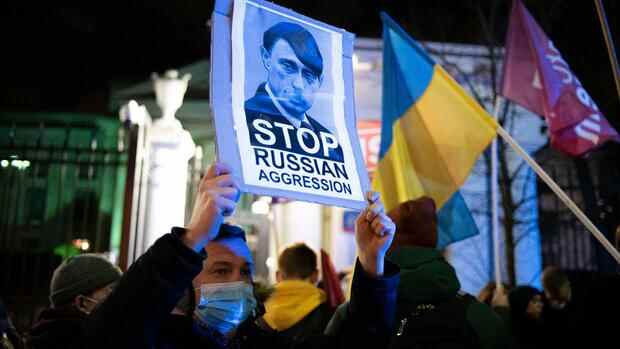Fear is growing among the population of Poland.
(Photo: imago images/ZUMA Wire)
Stockholm, Vienna For them, Putin’s war is particularly close: In Poland and the three Baltic countries of Estonia, Latvia and Lithuania, fear is growing after the Russian invasion of Ukraine, and their NATO membership does not change that. It is the fear of Putin’s unpredictability – that sooner or later Russian aggression could affect them themselves.
Early in the morning, Polish President Andrzej Duda was appalled by Russia’s actions: he said it was a brutal, unprovoked and unjustified attack. Poland will support Ukraine to the best of its ability. The foreign ministers of the Baltic states were also shocked in their initial statements.
“All of us across the international community must condemn it in the strongest possible terms and impose the toughest sanctions, including Russia’s decoupling from Swift,” said Estonian Foreign Minister Eva-Maris Liimets, Latvian Foreign Minister Edgars Rinkevics and his Lithuanian counterpart Gabrielius Landsbergis.
Russia must be “politically isolated”. Swift is a major payment service provider that handles international transactions.
Top jobs of the day
Find the best jobs now and
be notified by email.
In Lithuania, President Gitanas Nauseda announced the imposition of a state of emergency. He will sign a corresponding decree, which is to be passed by Parliament in an extraordinary session later today.
Lithuania borders Russia via Kaliningrad and shares a border with Belarus. Russia has around 30,000 soldiers stationed there. Due to the situation in Ukraine, the three Baltic countries are preparing for refugees from Ukraine.
All three Baltic foreign ministers are currently on a visit to Ukraine. They originally wanted to visit the Ukrainian-Russian border. Due to the current situation, the three Baltic foreign ministers will leave Ukraine by land.
But before that, they underlined their solidarity with Ukraine in a joint statement. “Dear Ukrainian friends, we are in your historic capital, Kiev, we support you and we will do everything possible to ensure that the attacker pays the highest possible price. Slava Ukraini,” they wrote. “Slava Ukraini” means “Glory of Ukraine”.
Approval from the federal government for the delivery of East German howitzers is pending
Estonia, Latvia and Lithuania have been demanding a tougher approach towards Russia for weeks. Fears of a Russian invasion of Ukraine had grown steadily in the Baltic states in recent weeks. Memories of the Soviet occupation of the three countries were revived. After gaining independence from the Soviet Union in 1991, all three countries joined the European Union and NATO.
The countries had spoken out in favor of arms deliveries to Ukraine at an early stage. “We consider it very important to help Ukraine in any way we can,” said Prime Minister Kaja Kallas. Your country wants to supply arms and ammunition to Ukraine. This also includes howitzers from GDR stocks.
For a delivery to the Ukraine, however, Estonia needs the consent of Germany, which had initially delivered the artillery pieces to Finland. Finland then passed them on to Estonia. The request is still being examined in Berlin, while Finland gave its approval for the transfer to Ukraine on Thursday morning.
In recent weeks, Poland has also repeatedly called for tough action to be taken against Putin’s provocations. Warsaw has been trying for weeks to actively demonstrate its closeness to the United States and to shelve old disputes.
The Baltic States feel threatened by their close proximity to Russia.
(Photo: dpa)
In fact, there had previously been increased irritation. The reason was a media law that the government had pushed through parliament in a cloak-and-dagger operation shortly before Christmas. It stipulated that broadcasting licenses could only be granted to companies that have their headquarters in the “area of the European Economic Area”.
The law also targeted the US broadcasting group TVN, which operates in Poland. In contrast to the public broadcaster TVP, which has been infiltrated by the ruling Law and Justice Party (PiS), TVN is considered credible.
More on the Ukraine conflict:
However, President Duda averted a crisis with the United States at the last moment, probably because he did not want to strain relations with the United States in view of the Ukraine crisis. He vetoed the law, which was supported not least by Deputy Prime Minister and PiS leader Jaroslaw Kaczynski.
A lively political exchange took place between the USA and Poland last week. US Secretary of Defense Lloyd Austin recently paid a visit to Poland and called the country one of the country’s staunchest allies. Poland’s army, which has over 150,000 soldiers, has been heavily upgraded by the US for some time.
The US State Department approved a major arms deal about a week ago: the US will supply Poland with 250 Abrams tanks. Poland itself has been a not insignificant arms supplier to Ukraine in recent years. From 2014 to 2020, the country delivered military material to the east worth around 660 million euros.
Poland and Ukraine are mainly connected through migration. Around 1.3 million Ukrainians live in the neighboring country, mostly as migrant workers. They at least partially replaced those Poles who had emigrated to an EU country to work there.
Poland’s government has recently repeatedly sent out signals that it is ready to take in Ukrainian refugees. “Poland’s doors will be open,” Prime Minister Mateusz Morawiecki announced. Preparations are being made to take in a million people, if Poland is able to do so.
More: EU announces toughest sanctions package in history
